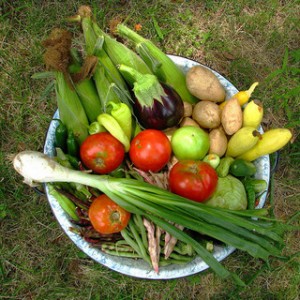I made the choice to give up a career in law and return to my family farm. Now, I wait to see if my daughter will do the same.
by Shannon Hayes
posted May 12, 2014

Photo by Lenny Montana / Flickr.
The snow still lay thick on the ground outside the window on a March morning a few weeks ago as Saoirse struggled over her math lesson. Customarily quick to pick up on each progressive step in the syllabus, on that particular morning her brain had a mental block on decimals. The muscles on her face were taut with frustration, and I feared the ferocity of her pencil scratchings would pierce through to my kitchen table.
“Let’s put it away for today,” I suggested. (Usually a popular proposition).
“No.” The fingers around her pencil tightened until her knuckles were white.
I furrowed my brow. “Saoirse, sweetie, we’re both wasting our time today. Some days are like that. Let’s quit.”
“I. Want. To. Finish.” She hissed the last word with such vituperation, I was hesitant to contradict.
Her body and soul were responding to the sun, making it impossible to concentrate on books, pencils, or paper.
The March sunlight poured in through the southern window, washing her shoulders and bathing her angry blonde head in a halo of late winter light.
I tried again. “There’s no sense going through the lesson if it isn’t going to make sense to you today. You’re clearly not in the mood.”
Her face turned slightly to meet the sunlight as it reached through the window toward her, then she whipped around to meet my gaze once more, fury and desperation pouring from every muscle in her body.
“I don’t want to be sitting here doing homeschool when the snow melts!” Her blazing eyes suddenly softened and welled over with tears. But she continued. “And every day we don’t finish a math lesson is another day longer I have to stay in school. And if I’m in school, then I can’t be at the farm. And I want to be at the farm. I want to help Pop Pop with lambing. I want to plant a garden. I want to weed it. I want to work in it. I, I don’t want to be sitting here with a stupid math bo-ooo-k.”
She sobbed, allowing her shoulders to melt back into her chair, taking in the warmth from the rays.
I looked out the window. The snow was rimy and thick. The air was still cold enough for us to go skating on our neighbor’s pond, but the light had changed. There was no doubt about it. Saoirse’s body and soul were responding to the sun, making it impossible for her to concentrate on anything involving books, pencils, or paper.
I remember the first time that pull drove me to drastic measures. I had spent my last year as an undergraduate studying for the LSATs, determined to make my family proud and become a lawyer. What I didn’t anticipate was that the exams would fall on the first real spring day in late April. I entered the examination room with several hundred aspiring law students and managed to sit through less than 30 minutes of the exam before my palms were in a full sweat, my heart raced, and feverish streams of panic showered over my thoughts, breaking my concentration.I was sitting in a four-hour exam in a windowless room while the sun was shining.
In a flash, I saw my life before me if I finished that test—countless sunny days wasted indoors in windowless rooms. I walked out a few minutes later, choosing to follow the sun. Ultimately, it led me home to my family’s farm.
I smiled inwardly as I watched the sun make the same pull on Saoirse’s spirit. I like for my kids to understand math, but I like even more to see them drawn to immerse their bodies in the agrarian life that so many generations of my family have chosen. We made a deal. We would accelerate the schedule, and lessons would be finished by the time the snow melted so she would be ready in time to help Pop Pop with lambing season.
In a flash, I saw my life before me if I finished that test—countless sunny days wasted indoors in windowless rooms.
We met our deadline, and Saoirse was standing in the barn on the sunny spring day last week when the first lambs chose to make their entry into the world. Her skinny legs defied the gravitational pull of her oversized rubber boots as she ran back and forth from the house to the barn, reporting on each new birth, and the health condition of every lamb. She talked nonstop on the ride home that day, brimming with details about which ewes had delivered a set of twins, which had given birth to triplets, which needed extra feeding, how wet the lambs were when they first came out, how she had learned to scan the flock to see who would go into labor next.
For two days, she lived outdoors, drinking in the spring sun as she welcomed each new lamb. And then the weather changed. Temperatures plummeted. Rain and snow fell from the sky and gray clouds oozed over the farm, commanding that our wood fires be lit once more.
But the lambs kept coming. Bob drew the barn door closed to block the wind, but the newest members of the flock fell to the barn floor and quickly became listless and hypothermic. Two days of the soul-nourishing work of guiding new lambs and mothers to nursery pens gave way to tube feeding, converting cardboard boxes and old towels into beds beside the wood stove, and the morose drudgery of carrying away the dead.
In years past, when the girls were younger, we consciously played down the deaths. One of us would scurry the bodies out to the compost before the girls noticed, breaking the news later when we were cozy in our kitchen that “They didn’t make it.” Simple. Detached. And the girls and I would get back to our homeschool lessons. But the pull of the sun had brought Saoirse fully into the realities of spring this year.
She maintained her poise as she dutifully helped her grandfather find the hypothermic lambs and bring them indoors. She sat over them and rubbed their cold bodies with her hands, willing them to live. But death’s victory was not shrouded for her this year. She watched her Pop Pop unceremoniously carry the lifeless bodies away to be tossed on the compost. She climbed into the car that night and burst into tears.
Then, behind the safety of the rolled up windows, she screamed, “I hate this farm!”
We’ve all said it. We’ve all taken Sap Bush Hollow’s brutalities, shouldering our way through her harsh weather and her excessive demands for labor, daily confronting the effects her reckless nature has on our livestock and on our own spirits.
It’s part of the business. We get used to it. In our own journey, Bob and I have learned that in one moment, all is bliss. In another, all is hell. But given a little time, things settle out once more, and bliss returns.
Lambs die. It’s true. In this business, there are cold calculations made around that simple fact. A certain percentage will live, a certain percentage won’t. If the calculations are correct, we’ll have an adequate crop survive to harvest age, and we will pay our bills.
The premature deaths cause heartache, no matter how many lambing seasons we have seen. But we grow adept at waiting for the next moment. The one where you see a newborn’s tail wiggle furiously as it latches onto its mother for the first time; or where they nestle, their necks entwined with each other, for warmth; or frolic with each other and play king of the mountain on hay bales, or let their bodies soften into the pasture to drink in the sun.
Forty years on a family farm has taught me that Saoirse will either get over this or find a different path. If she stays on the agrarian path, she won’t grow callous to the daily tragedies. She will experience them as fully as the rest of us. But she’ll learn to watch for the next moment of bliss, and she will move toward it as naturally as she moves toward the pull of the sun.
I don’t dare say any of this as she expresses her anguish. Her emotions are real, and she must be allowed to feel them freely, in her own way. They may be old to her father and me, but they are new for her. We get home, and Saoirse and I go for a walk, our arms wrapped around each other. We skip supper and quietly climb the stairs to my bed, where we cuddle and read together.
Forty years on a family farm has taught me that she will either get over this or find a different path.
Being a lawyer would have spared me from Saoirse’s heartbreak on this night. Studying decimal numbers may have protected her body from this day’s driving rain and snow; and it would have sheltered her heart from the sadness that ensued. But the gravitational pull of the sun is fierce. And when we surrender to it by way of an agrarian life, we surrender to all the elements of nature. The day I chose not to be a lawyer was the day I knew I would ultimately submit to the sun. There will come a point on Saoirse’s path when she will have to make a similar choice. I cannot push one way or another. I can only wait.
The next morning, she comes down the stairs to find me at my desk. She wraps her arms around me in greeting, her body once more in a state of bliss just to be alive and full of love. We gaze out the window, hoping to see a change in the weather. But the sky is gray, the ground is wet.
“Would you rather stay home today?” I must give her the choice. She looks around the room, and I watch her carefully noting the warmth of the fire in my office, the smell of the coffee Bob has freshly ground. I see her weighing her choice carefully.
“I’ll go to the farm.”
I hope the sun will shine for her.





 Shannon Hayes wrote this article for
Shannon Hayes wrote this article for


